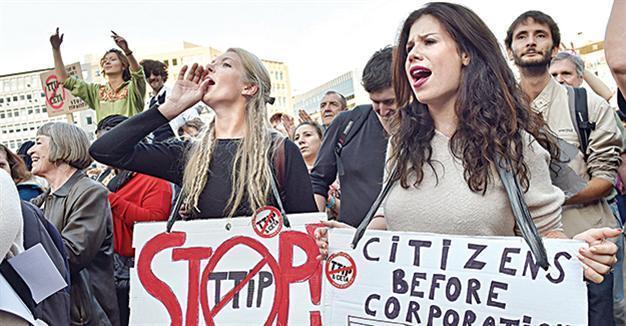US-EU economic relations in for stormy weather
WASHINGTON - Agence France-Presse

REUTERS photo
With spats over Apple and Deutsche Bank and squabbles about Airbus and Boeing, approaching elections on both sides of the Atlantic are exacerbating strains in U.S.-European economic relations.The recent controversy over taxing the iPhone maker surely epitomizes the situation best. European authorities’ decision in late August to force the American giant Apple to pay $14.5 billion in taxes to Ireland infuriated officials in Washington and is still ruffling feathers.
U.S. Treasury Secretary Jacob Lew has repeatedly expressed his astonishment and openly accused the Europeans of “disproportionately” focusing on US corporations.
On the other hand, the U.S. Justice Department’s $14 billion proposed settlement with Deutsche Bank over trading in mortgage-backed securities derivatives has rattled nerves in Europe, where some accuse Washington of coming down particularly hard on foreign banks.
Add to this the U.S. victory at the World Trade Organization this week in the battle over Europe’s purportedly illegal public subsidies to Airbus.
The matter is not yet concluded but the United States could in theory claim billions of dollars in compensation from Europe.
And to top it off, negotiations on the Transatlantic Trade and Investment Partnership, which are to resume in a week in New York, are also foundering, not only because of divergent positions but also because of the calendar.
The Americans still insist the agreement could be signed before the end of the year while President Barack Obama is still in office. The Europeans now say this is “not realistic.”
There has always been friction among the two allied sides, but this time things are worsened by the uncertainty from the coming presidential elections, set for November 8 in the US and for April in France. General elections are due to be held in Germany before the end of 2017.
“In normal times, both sides would easily reach a compromise on these issues but the problem is that it is coming in this incredibly uncertain environment,” said Edward Alden of the Council on Foreign Relations, a New York think tank.
The rise of protectionist views in the United States with the candidacy of Republican presidential nominee Donald Trump and in Europe, with the British vote to secede from the EU, has electrified talks and complicated reactions from current governments.
“The danger is that what should be routine disputes become harder and harder to deal with in this environment,” said Alden, adding that both Europe and the United States are now “disoriented” by the rejection of trade liberalization.
Assailing trade partners then becomes tempting.
American offer nothing’
And so France took the gloves off recently, decrying the purported stubbornness of the United States in trade talks. “The Americans offer nothing or crumbs.... This isn’t how allies should negotiate,” French Foreign Trade Minister Matthias Fekl said last month.
He then drove home the point, saying it would be “inconceivable” to continue talks so long as the Americans persisted in applying their laws in supposedly extraterritorial manner on European companies.
The French bank BNP Paribas was a case in point, settling with the Americans for $8.9 billion in 2014 over alleged sanctions violations.
But some experts express doubts about such head-butting.
“I don’t think you can really score points in the coming elections in the United States or Europe by attacking trade partners,” said Sebastian Dullien of the European Council on Foreign Relations in Berlin, adding nevertheless that “some populists may think so.”
Others point out that past transatlantic troubles have been overcome without too much difficulty.
At the time, the penalties imposed on BNP Paribas by the United States did cause pronounced tension.
But in the light of day, things look a little different, said Jacob Kirkegaard of the Peterson Institute for International Economics in Washington.
“Who today could argue that the U.S.-EU economic relationship was really badly damaged by this case?” he asked.
















